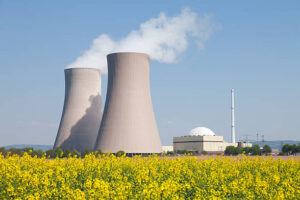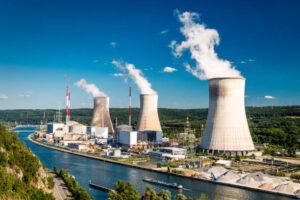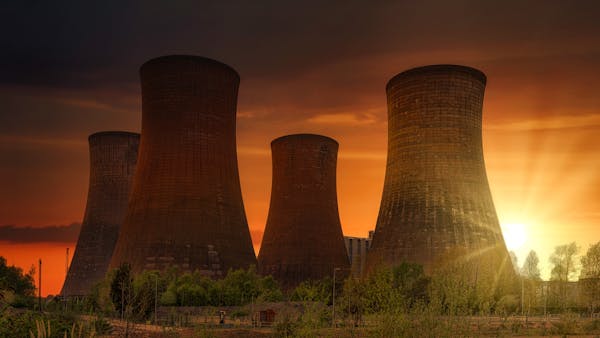You may wonder what exactly nuclear energy is. At its heart, nuclear energy is a form of energy released from the nucleus of atoms, the tiny particles at the center of every element. The most common method of harnessing this energy is through a process known as nuclear fission, where the nucleus of an atom splits into two smaller nuclei, releasing energy in the form of heat.

This heat is powerful. In a nuclear power plant, it’s used to turn water into steam. That steam then spins turbines connected to generators to produce electricity. It’s a sophisticated dance between physics and engineering that lights up our cities and powers our homes.
Globally, nuclear energy has carved out a significant role in the energy landscape. It’s a heavyweight contender, especially when the world is grappling with the need for clean and stable power sources. The intensity of energy it produces without the direct emission of carbon dioxide makes it a compelling option in the arsenal against climate change.
Many of us are used to hearing about renewable sources like solar and wind power. Nuclear energy often enters the conversation as a contrasting point. Unlike wind or solar, nuclear power plants can produce a stable, consistent output regardless of weather conditions. It’s an always-on source that has a remarkably small footprint in terms of the land it occupies.
The advancements in nuclear technology over the years have gone hand-in-hand with enhanced safety measures. Technologies like the next-generation reactors and passive safety systems have increased the robustness of nuclear power plants. These developments aim to reduce the risk of accidents, ensuring a safer way to harness nuclear power for generations to come.
However, even with rigorous safety protocols and technological leaps forward, concerns around nuclear energy persist. It’s no simple matter, and each apprehension merits examination. But with the global demand for energy climbing, and the simultaneous need to decarbonize our energy supply, nuclear energy stands as a powerful tool—if used responsibly.
Nuclear Energy’s Impact: Analyzing the Good, the Bad, and the Economic Boost:
So, we’ve taken a close look at nuclear energy, what it is, and how it operates. Now, it’s pivotal to discuss the broader implications. Is nuclear energy a force for good or bad? Like any significant source of power, it has its dualities. Advocates praise its ability to produce vast amounts of electricity without carbon emissions, contributing to a cleaner environment and abating climate change. It’s these factors that spotlight its sustainability credentials, placing it at the forefront of clean energy discussions.

However, there’s a flip side. The challenges, notably waste disposal and the heightened concern around catastrophic accidents, loom large in public consciousness. Addressing these risks requires meticulous management and regulatory oversight, but let’s not forget the strides in safety technology that have reduced such risks to historically low levels.
On the economic front, nuclear energy packs a significant punch. From job creation in engineering and construction to the stability it can offer energy grids, the economic contributions are substantial. Lower and more predictable energy costs bolster business and consumer spending, which in turn fuels economic growth. This stability is not just beneficial for energy bills, but for national security as well, as it reduces reliance on volatile fossil fuel markets and geopolitical tensions.
Looking to the horizon, the economic impetus provided by nuclear power is poised to expand. With increased investment in next-generation reactors and breakthroughs in waste reduction techniques, the nuclear industry could rev up economies while keeping sustainability in the driver’s seat. The progression of nuclear energy technology continues to promise a significant role in our pursuit of a balanced and responsible energy future.
In conclusion, nuclear energy is a complex actor on the world stage, with its capacity for profound environmental and economic impacts. It’s not a panacea, but neither is it a pariah. As global energy needs grow and the clamor for clean power rises, nuclear energy stands as a contentious yet capable contender, wielding the power to shape our environmental landscape and energize our economies for years to come.
